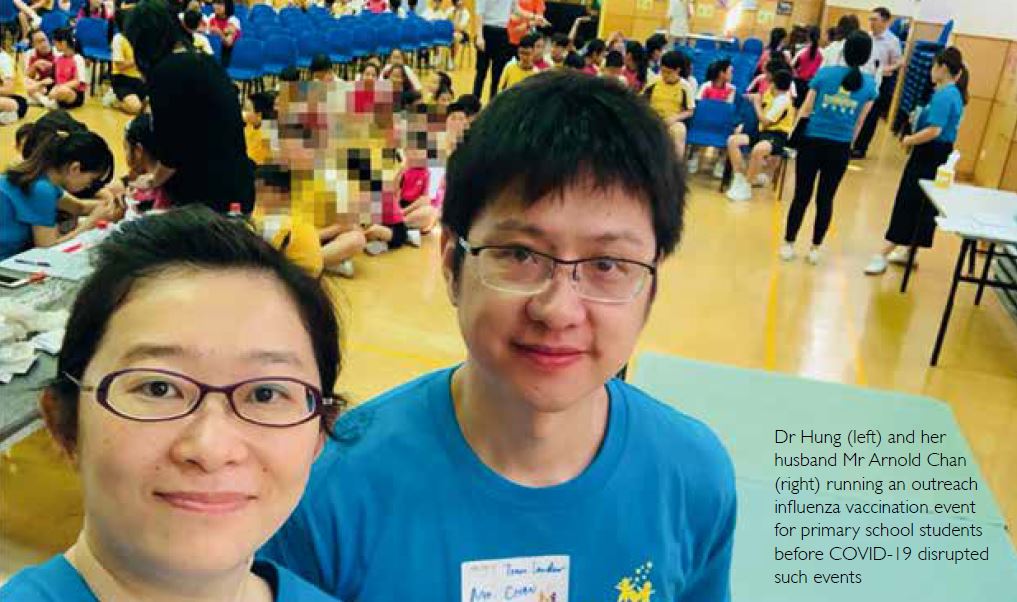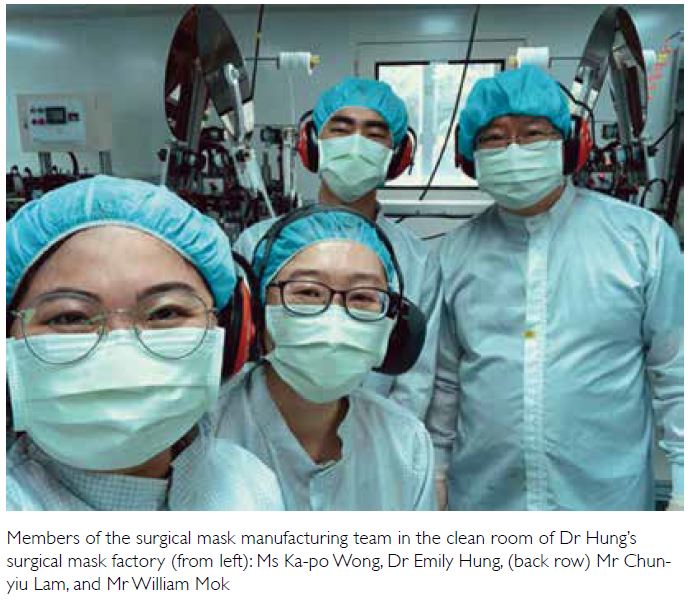© Hong Kong Academy of Medicine. CC BY-NC-ND 4.0
HEALTHCARE FOR SOCIETY
Making the world a better place: an interview
with Dr Emily Chi-wan Hung
Rex WH Hui1; Alex Q Liu2
1 Department of Medicine, The University of Hong Kong, Hong Kong
2 Department of Surgery, Prince of Wales Hospital, Hong Kong
The severe acute respiratory syndrome (SARS)
outbreak in Hong Kong in 2003 and the more recent
coronavirus disease 2019 (COVID-19) pandemic
have impacted many people’s lives. Few people,
however, have had their careers so profoundly
transformed by these events as Dr Emily Chi-wan
Hung.
Following an unusual career path
After graduating from The Chinese University of
Hong Kong (CUHK) in 2000, Dr Hung initially
pursued specialty training in paediatrics, as she
believed in managing diseases in early life and
making a lasting impact on patients’ lives.
However, during the SARS outbreak in
2003, Dr Hung’s career took its first major change
in course. While studying for an undergraduate
degree at the University of Cambridge in the
United Kingdom, Dr Hung had completed a year
of training in pathology and virology, with special
research focus on human papillomavirus. Because
of this background in virology, Dr Hung felt that
she could contribute to the effort against SARS,
and joined the SARS molecular sequencing team at
CUHK. This opportunity led to her to join academia
after the completion of her specialist training in
paediatrics, and she spent several years researching
serum circulatory DNA until she returned to clinical
practice as a paediatrician in 2010.
Giving back to the community
Giving back to the community
Dr Hung firmly believes in the importance of giving
back to society, and throughout her clinical career,
she has maintained passion and commitment to
such contributions. A major focus of Dr Hung’s
charitable efforts has been the Little Life Warrior
Society (https://www.llws.org.hk/). The Little Life
Warrior Society organises various activities and
support groups for paediatric oncology patients
and their families, including in-patient ward visits,
out-patient activity groups, schoolwork tutorials,
and even haircuts for patients. “After my rotation to
the Children’s Cancer Centre of the Prince of Wales
Hospital Department of Paediatrics in 2004,” recalls
Dr Hung, “I was saddened by the unpredictable
disease course of childhood cancers, and the
devastating effect it had on young patients and their
families.” Dr Hung became a medical advisor for the
Little Life Warrior Society in 2004, and participated
in various activities, including its Youth Group,
which supported children cancer survivors who
have grown up to become teenagers. She served as
a medical advisor for the Society from 2004 to 2012.
As a paediatrician, Dr Hung is a firm believer in
disease prevention. In 2016-17, the overall influenza
vaccination coverage rate for school children aged 6
to 12 years was only 16%, whereas school-initiated
outreach vaccination activities achieved a coverage
of about 50%. Therefore, the Department of Health established the School Outreach Vaccination Pilot
Programme and the Enhanced Vaccination Subsidy
Scheme in 2018-19 to further increase participation
of schools. Dr Hung participated in these schemes
and has run outreach influenza vaccination events
at different primary schools and kindergartens in the
past few years. “The outreach events are important
to me because they are instrumental in increasing flu
vaccine coverage in children,” says Dr Hung, “This
helps to minimise outbreaks, severe complications,
and deaths due to influenza in children.”
In addition to her busy clinical work and
charitable contributions, Dr Hung also strives to
promote medical development in Hong Kong. In
order to nurture the younger generation, she holds
teaching sessions in her clinic for medical students
at CUHK, and she works as a regional trainer for
neonatal resuscitation. She is currently an honorary
clinical associate professor of her alma mater. In
2015, Dr Hung was selected for the Ten Outstanding
Young Persons award in Hong Kong in recognition
of her exemplary contributions to medical education
and healthcare promotion in Hong Kong. “It was
a very humbling and rewarding experience to be
selected for this award,” said Dr Hung.
Making high-quality masks for
Hong Kong
Similar to the SARS epidemic in 2003, COVID-19
brought about another major career change for Dr
Hung. She is once again at the forefront of battling
the pandemic, but this time she has adopted her
innovation and skills into a new venture. The COVID-19 pandemic caused a sudden surge in demand for
surgical masks. In the early days of the outbreak,
mask shortages were causing panic in Hong Kong.
While procuring masks for her outreach vaccination
programmes in January 2020, Dr Hung found that
many companies were unable to provide masks or
even shipment dates for deliveries. In order to help
meet this demand, Dr Hung decided to develop a
surgical mask manufacturing and production line in
Hong Kong with her husband, who has a background
in engineering. Throughout the endeavour, Dr Hung
and her husband had to overcome many challenges.
Owing to worldwide demand for the raw materials
needed for mask production, supplier delays were frequent, and some suppliers even raised their
prices to increase profits. Setting up a clean room
for mask production also proved difficult, requiring
high-quality renovation work and revisions to meet
international standards. There was even trouble
sourcing qualified technical support staff, owing
to the travel restrictions at the time, so Dr Hung’s
team had to self-study to get the mask production
machine up and running. Despite the challenges,
the mask production line finally began operation in
July 2020. In addition to supplying masks to public
hospitals, Dr Hung’s company partnered with
philanthropists in Hong Kong to donate masks to
charitable organisations including The Salvation
Army, St James’ Settlement, and Refugee Union. Dr
Hung is adamant that quality must be maintained
over quantity, and takes pride in providing high-quality
masks for medical professionals and the
public.
When asked about her future goals, Dr Hung
reiterated the importance of altruism: “We have to
do the right thing to change the world and make it a
better place.”

Figure 1. Dr Hung (left) and her husband Mr Arnold Chan (right) running an outreach influenza vaccination event for primary school students before COVID-19 disrupted such events

Figure 2. Members of the surgical mask manufacturing team in the clean room of Dr Hung’s surgical mask factory (from left): Ms Ka-po Wong, Dr Emily Hung, (back row) Mr Chunyiu Lam, and Mr William Mok

